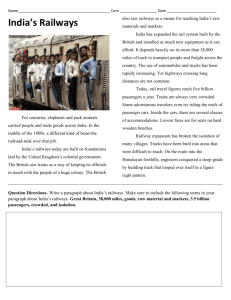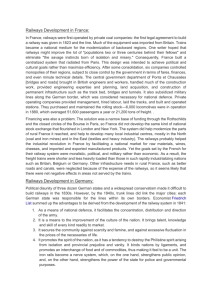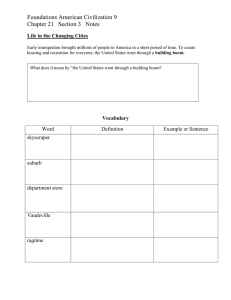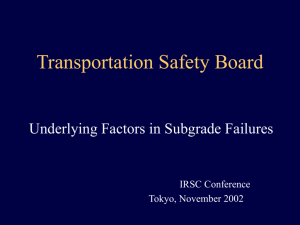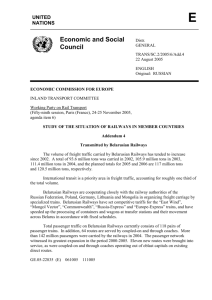Document 11236993
advertisement
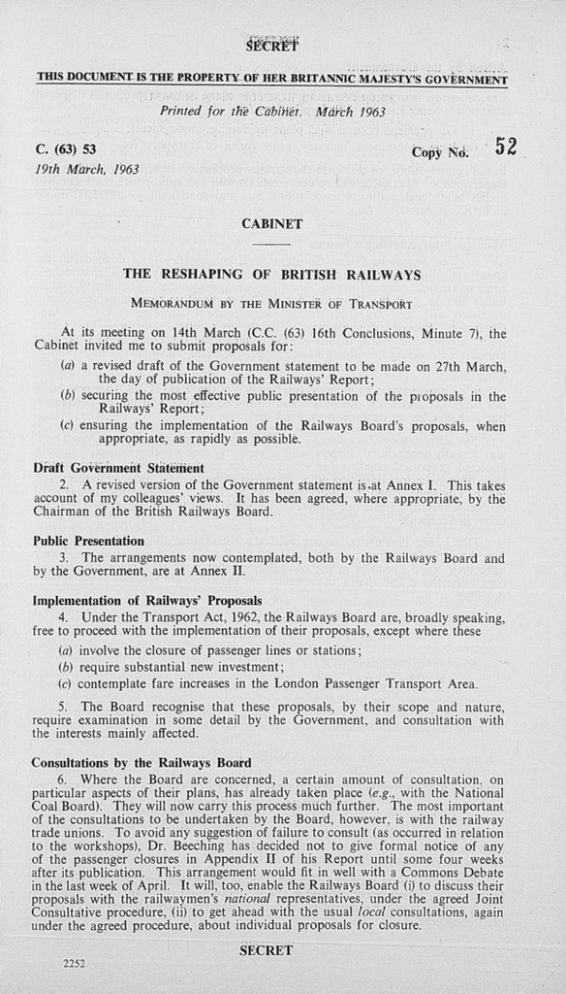
SECRET 7 Printed for the Cabinet. Mdrch C. (63) 53 19th Match, 1963 Copy Nd; 52 1963 CABINET THE RESHAPING OF BRITISH RAILWAYS MEMORANDUM BY THE MINISTER OF TRANSPORT At its meeting on 14th March (C.C. (63) 16th Conclusions, Minute 7), the Cabinet invited me to submit proposals for: (a) a revised draft of the Government statement to be made on 27th March, the day of publication of the Railways' Report; (b) securing the most effective public presentation of the proposals in the Railways' Report; (c) ensuring the implementation of the Railways Board's proposals, when appropriate, as rapidly as possible. Draft Government Statement 2. A revised version of the Government statement is,at Annex I. This takes account of my colleagues' views. It has been agreed, where appropriate, by the Chairman of the British Railways Board. Public Presentation 3. The arrangements now contemplated, both by the Railways Board and by the Government, are at Annex II. Implementation of Railways' Proposals 4. Under the Transport Act, 1962, the Railways Board are, broadly speaking, free to proceed with the implementation of their proposals, except where these (a) involve the closure of passenger, lines or stations; (b) require substantial new investment; (c) contemplate fare increases in the London Passenger Transport Area. 5. The Board recognise that these proposals, by their scope and nature, require examination in some detail by the Government, and consultation with the interests mainly affected. Consultations by the Railways Board 6. Where the Board are concerned, a certain amount of consultation, on particular aspects of their plans, has already taken place (e.g., with the National Coal Board). They will now carry this process much further. The most important of the consultations to be undertaken by the Board, however, is with the railway trade unions. To avoid any suggestion of failure to consult (as occurred in relation to the workshops), Dr. Beeching has decided not to give formal notice of any of the passenger closures in Appendix II of his Report until some four weeks after its publication. This arrangement would fit in well with a Commons Debate in the last week of April. It will, too, enable the Railways Board (i) to discuss their proposals with the railwaymen's national representatives, under the agreed Joint Consultative procedure, (ii) to get ahead with the usual local consultations, again under the agreed procedure, about individual proposals for closure. Action by the Government 7. An Interdepartmental Working Party, under Ministry of Transport Chairmanship, is urgently examining the merits "i the railways' proposals. Special attention is being given to their implications for (i) Government policies and plans (including employment); (ii) local government, industry, other forms of transport, &c. , Initial responsibility for work on the various problems has been allocated among Departments. Also there will be consultations with the appropriate representative bodies (e.g., local authority associations, bus and road haulage interests, major industrial associations, &c). Machinery for Effecting Closures 8. The Transport Users' Consultative Committees'.-A lot depends on the speed and efficiency with which these Committees—and my own Department—­ carry out their responsibilities in regard to passenger closures. The new procedure under Section 56 of the Transport Act, 1962, has therefore been explained to, and discussed with, the Transport Users' Consultative Committee (T.U.C.C.) Area Chairmen. Special reference was made to their relationship with the Traffic Commissioners (in regard to bus services), and to the practicability of expediting business by dividing the Committees into panels. They have also been invited to strengthen their secretariats, where necessary. 9. I have powers to increase the number of the T.U.C.C's. This possibility has been discussed with the Area Chairmen, who think it will not be necessary: but I shall take action quickly if need be. 10. Ministry of Transport.-Th.Q Railways group in my own Department was recently reorganised, largely with a view to work on the Railways Board's expected proposals, whether for closure or for new investment. Arrangements have been made for consulting other interested Departments, and also for securing, via the Divisional Road Engineers, the views of Highway Authorities, on any road problems resulting from rail closures. I understand that similar steps are being taken in Scotland. 11. I hope that my colleagues will feel satisfied, that all suitable preparations have been made for dealing with the Railways Board's proposals, and that I may have their help, especially in the consultations that must take place between my own Department and theirs, in ensuring that decisions are reached as quickly as possible. E. M. Ministry of Transport, S.E. 1, 18th March, 1963. ANNEX I D R A F T PROVISIONAL GOVERNMENT STATEMENT BOARD P R O P O S A L S - D R A F T E ON RAILWAYS The Railways Board's proposals for reshaping the British railway system have been published to-day. These proposals flow from the most massive compilation and systematic analysis of information about our railways ever attempted. They offer a firm prospect of a modern railway system suited to the country's future needs. The present subsidy is about £150 million per annum, and this vast sum is a measure of the railways' claim on economic resources which could be better used elsewhere. The Board's lucid analysis and bold, proposals fully accord with the Governments expectations. The aim, which is wholly consistent with the Governments policy of growth, modernisation and redevelopment, is to produce an efficient and modern railway system handling those traffics technically best suited to raih T h e Government agree that extensive reshaping.of our railways is, now essential.-. -;\ . . * - , , . ) . ,, . But the changes proposed will affect many people. Therefore further careful study and consultation by the Government will be necessary,. The Railways Board, for their part, will of course be following the agreed procedures for consultation with their staff. I should like now to deal with three main points. First, freight services. Clearly, rationalisation here is of the greatest importance, not merely to the railways' finances, but to industry and commerce. For example, by reducing rail costs and improving methods of distribution, the Railways Board believe that up to 7s. 6d. per ton could be saved on the carriage of some types of coal by rail. On freight as a whole the Board intend to discuss the future possibilities with their customers. They will also be discussing the implications of these proposals with other transport interests. Secondly, passenger services.—The most controversial part of the plan is the withdrawal of many passenger services. If better railway services are to b e provided to meet the real needs of the nation, such measures are necessary. But I must emphasise that, in the procedures to be followed when passenger closures are proposed, Parliament has laid down very extensive safeguards. Under the Transport Act, 1962, each proposal must be published in advance. Objections can be made to the Transport Users Consultative Committees, which will report to me on any hardship involved. No opposed closure may be carried out without my consent. For my part, I shall take into account all important factors, including social and defence considerations, the pattern of industrial development and possible effects on roads and road traffic. The Government are well aware that there will be some special problems, for example [in the more remote parts of Scotland, Wales and indeed England, some suburban areas, and in serving the sea-links with Northern Ireland] [some remote areas]. I must therefore give a lot of attention to the adequacy of alternative transport. A widespread network of bus services already exists, and my consent to closure can be made conditional on the provision and maintenance of additional services. I recently announced the arrangements for co-operation and co-ordination made between the Railways and London Transport Boards under the new Transport Act. The Government will closely consider those passages in the Report on suburban commuter services in London and elsewhere. My third point is on staff.-The effect of the Board's proposals on railway employees must be of special concern to the Board, the unions and the Government. Our railways will require fewer men in future. At present the best estimate of the total reduction over the next few years in the number of jobs among the staff affected by these proposals is of the order of 70,000. But most of this reduction would be effected by normal wastage and control of recruitment. Actual discharges are not expected to be more than a small proportion of the total staff reduction. The number will depend largely on how far it is possible to arrange for men to move to other work and different areas. Even so, there will be problems for those displaced. The Government will do all they can to help in re-training and placing them. We specially welcome the recent agreement between the Board and the unions representing the Conciliation grades. This does two things: first, it facilitates transfers from one part of the system to another; and, second, it provides fair compensation for those for whom work can no longer be found on the railways. The Government will proceed speedily with their consultations and discussions, so that we can soon make a fuller statement. We shall pay special regard to the long-term requirements of particular areas [including those arising from planned movements of population and industry] and to the relationship of the railways to other forms of transport. o r ; ; '.' : ,-.'' : ; , ; v ? " A N N E X II : PROPOSED PUBLICITY PROGRAMME 1. A comprehensive publicity programme has beeri Worked Out by the Ministry of Transport and the British Railways Board. The programme is outliried below. 2. The Minister and Dr. Beeching Will jointly brief Ministry arid Board Press Officers (including the Bbard's regional Press officers) at 10:30 a.m. on Monday, 25th March. 3. Publicity Initiated by Railways Boalrd (a) Advance copies of the Report together with a Press notice will be issued to the Press under embargo at noon on Monday, 25th March. (b) Members Of the Board, but riot the Chairman, will be available on Tuesday, 26th March, to brief individual correspondents. Particular attention will be paid to the two London evening newspapers whose treatment of a Report often sets a tone which the national dailies follow. (c) Dr. Beeching will hold a Press conference at 11 a.m. on 27th March followed by television news interview. Regional Press conferences will be held around noon on 27th March. (d) The Board have produced a film which will be shown to railwaymen throughout the country. This film has been offered to the B.B.C. as a basis for a television programme which would include also an interview with Dr. Beeching. The B.B.C. are considering the proposal. ie) T h e Report will be distributed to the Board's staff down to district officers (about 4,000). A special poster addressed to all railwaymen is being prepared. This will contain a short summary of the Report. The proposal to provide each railwayman with an individual copy of a summary of the Report has been abandoned. (/) Other members of the Board besides the Chairman will be available to appear in television programmes. Similarly, regional chairman will be available to appear in television programmes outside London. 4. Ministry Publicity Arrangements (a) A " fact s h e e t " of background information already on the record will be issued to Lobby journalists by the Public Relations Adviser to the Prime Minister on Thursday, 21st March. (b) The Minister and the Parliamentary Secretary (Mr. Hay) will meet selected journalists on Tuesday, 26th March for background briefing. (c) The Minister will make a statement in the House of Commons at 3.30 p.m. on 27th March. Copies will be given to the Press Gallery in the usual way. (d) The Minister will hold an open, i.e., attributable, Press conference at 4.30 p.m. on Wednesday, 27th March. A Press notice will be issued which will incorporate the Minister^ statement in the House and background information of events leading up to the Beeching Report. This will be followed by television news interviews. (e) Granada television will network a programme on the railways from 9.45 to 10.30 p.m. on Wednesday, 27th March. It will include interviews with the Minister and Dr. Beeching. 5. Other Publicity Arrangements (a) The Minister of Transport, in consultation with the Minister without Portfolio and the Chief Whip, will establish a panel of backbench M.Ps. who will be briefed in advance and be available to take part in regional television programmes. (b) The Minister of Transport, in consultation with the Minister without Portfolio and the Chief Whip, will arrange to address Government supporters in the House of Commons on the evening of 27th March. A brief for use in speeches would be supplied to them. (c) A meeting to be addressed by the Minister of Transport will later be offered to the Parliamentary Labour Party.


